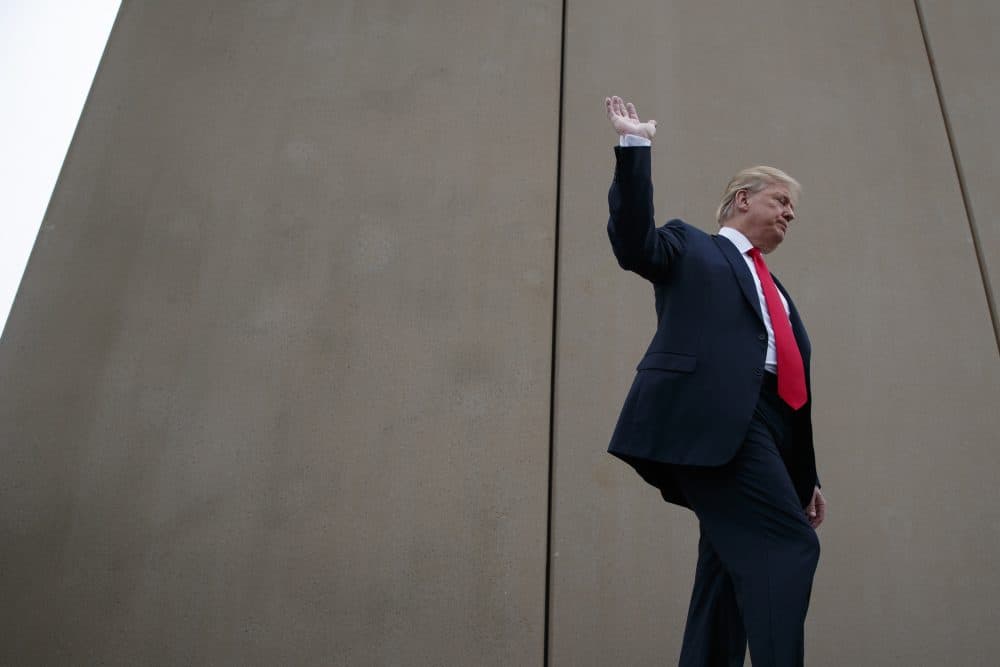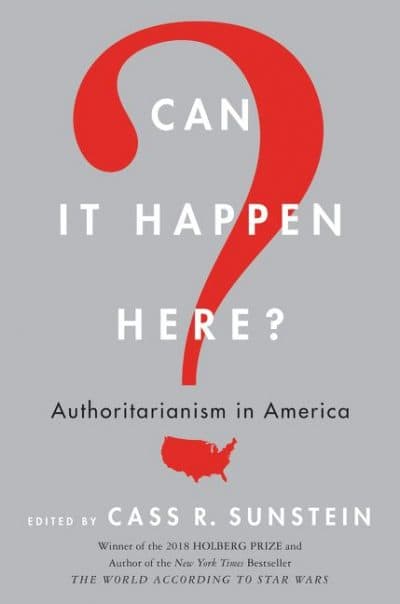Advertisement
Commentary
Could Trump Make Us A Dictatorship?

After two-plus years of batting his eyes at strongman rule, both while campaigning and in his ill-informed approximation of governing, Donald Trump has lots of people asking the question.
Can it happen here?
Those ominous words title a new book, the subtitle of which — "Authoritarianism in America" — clarifies the "it" that editor Cass Sunstein has in mind. A Harvard law professor, Sunstein has collected essays by diverse thinkers (himself included) who, pondering our president’s autocratic peacock feathers and the rise of authoritarians in other democracies, disagree on whether the U.S. could careen into the banana-republic gutter.
Sunstein himself makes a strong case that all-out despotism is unlikely. But another contributor makes an equally persuasive case that we’re vulnerable to a president chipping away at the edges of our liberties. That can happen here, because it has happened here, throughout our history.
University of Chicago law professor Geoffrey Stone runs down a half dozen examples, starting in the Republic’s infancy. Under President John Adams — a founding father, no less — the 1798 Sedition Act convicted more than two dozen people for “false, scandalous, and malicious writings” about political leaders.

Abraham Lincoln’s suspension of habeas corpus during the Civil War, another example Stone cites, was declared unconstitutional by the Supreme Court after the conflict ended. But the Court has never invalidated the law under which progressive icon Franklin Roosevelt interned 110,000 Japanese Americans during World War II, though Stone says it remains a “black mark” on the SCOTUS record. In between Lincoln and FDR, courts and prosecutors used newly passed espionage and sedition acts to muzzle criticism of President Woodrow Wilson’s government during World War I.
Stone also reminds us of government surveillance of dissidents and other encroachments on liberty during the Cold War and Vietnam War.
Even Sunstein, who thinks our democracy resilient, told an interviewer that the recurring impulse behind these past abuses is “not Hitler, it’s not Mussolini, but it’s something that Americans should concern themselves about.”
Like these previous presidents, Trump hasn’t made a blatant lunge for dictatorial power. But his intermittent impulses toward autocracy have made it necessary for advisers, Congress and courts to contain him.
He argued during his campaign for the efficacy of torture and prosecuting his opponent, Hillary Clinton. He has threatened media whose coverage he found insufficiently admiring, and tried to suppress the Trump-damning book "Fire and Fury."
He proposed an un-American religious test for immigrants and refugees to ban Muslims; infected the body politic with nepotistic and business-crony appointees; shrugs off Russian meddling in our elections; and discussed a mass roundup-cum-deportation of illegal immigrants. (Arrests of undocumented immigrants surged during Trump’s first year, though not deportations as of yet.)
To top it off, the president plays fawning footsie with real dictators.
"Can It Happen Here?" discusses how Trump-like populism has left democracy wobbling in Hungary and Poland, where elected strongmen have variously packed courts and government bodies or otherwise curtailed their ability to challenge the leaders. More recently, Italian elections so rewarded far-right parties that one observer tweeted, “While we were sleeping, Putin won the Italian election.”
One Italian voter told the New York Times this about a xenophobic leader: “Salvini is a good man. I like him because he puts Italians first. And I guess he’s a fascist, too. What can you do?”
Um, you could remember Mussolini and what he did to Italy. But respecting history is too much for populist voters, there or here.
Another essay in Sunstein’s book, by two psychologists, suggests that “authoritarianism is an attribute of the follower, not necessarily of the leader,” bred in people by “lack of ‘openness to experience’ … and by cognitive limitations.”
That certainly describes Trump diehards, whose lack of openness to racial diversity and psychological jones for self-confident blowhards are the stuff of cliché. Hillary Clinton was impolitic but not wrong to label such people “deplorables.”
Can it happen here? Full-bore fascism is improbable. As for Trump’s history-mimicking, incremental assaults on democracy, so far, our institutions are reeling him in, mostly. But given his attitude, and that of the cheap seats he’s playing to in the electorate, the rest of us must make sure the institutions keep doing their job.
